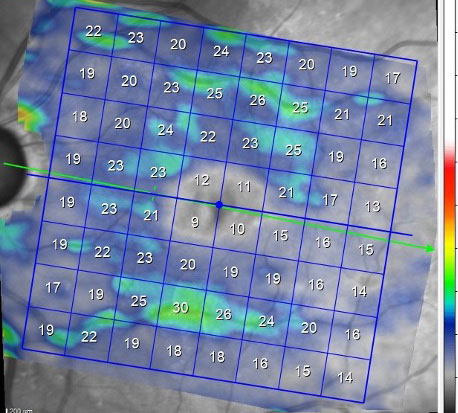 |
Systemic antihypertensive medications may conceal increased IOP or affect glaucoma risk in patients, recent study finds. Photo: James Fanelli, OD. Click image to enlarge. |
In addition to using topical glaucoma drops, many such patients also take systemic oral hypertensive medications to control blood pressure. These systemic medications may have effects on glaucoma and intraocular pressure (IOP), however. A recently published meta-analysis review paper in the American Journal of Ophthalmology examined existing evidence on these drugs and reported that systemic antihypertensives may obscure elevated IOP.
The researchers examined five drug classes and gathered studies preceding December 2022, including 10 in their meta-analysis and 11 in their review. They reported that systemic beta-blockers were associated with lower odds of having glaucoma as well as lower IOP. Calcium channel blockers were linked only with higher odds of glaucoma. The researchers also reported no consistent associations among angiotensin-converting enzyme inhibitors, angiotensin receptor blockers or diuretics with glaucoma or IOP.
They wrote in their paper that their findings concerning beta blockers and IOP were similar to those of two previously published studies on small clinical populations of patients with and without glaucoma. “The mechanism of action is thought to be that enough systemic beta-blocker medication reaches the anterior chamber to reduce formation of aqueous humor and reduce IOP,” they wrote. “Thus, systemic beta-blockers likely protect against glaucoma by reducing IOP.”
On the other hand, they noted that calcium channel blockers may increase glaucoma risk through an IOP-independent mechanism, since this drug class wasn’t found to be associated with IOP. Though this finding wasn’t in line with previously published research, the researchers suggested that calcium channel blockers may protect against normal-tension glaucoma by dilating ocular vessels and improving optic nerve perfusion. Overall, they noted that their data was only as good as the participants’ compliance with taking the medication.
“Systemic beta-blockers to treat systemic hypertension may be beneficial in those at risk for glaucoma while systemic calcium channel blockers may be harmful,” they concluded in their paper. “Clinicians should be aware that systemic antihypertensive medications may mask elevated IOP or positively or negatively affect risk of glaucoma.”
Leung G, Grant A, Garas AN, et al. A systematic review and meta-analysis of systemic antihypertensive medications with intraocular pressure and glaucoma. Am J Ophthalmol. March 24, 2023. [Epub ahead of print]. |

